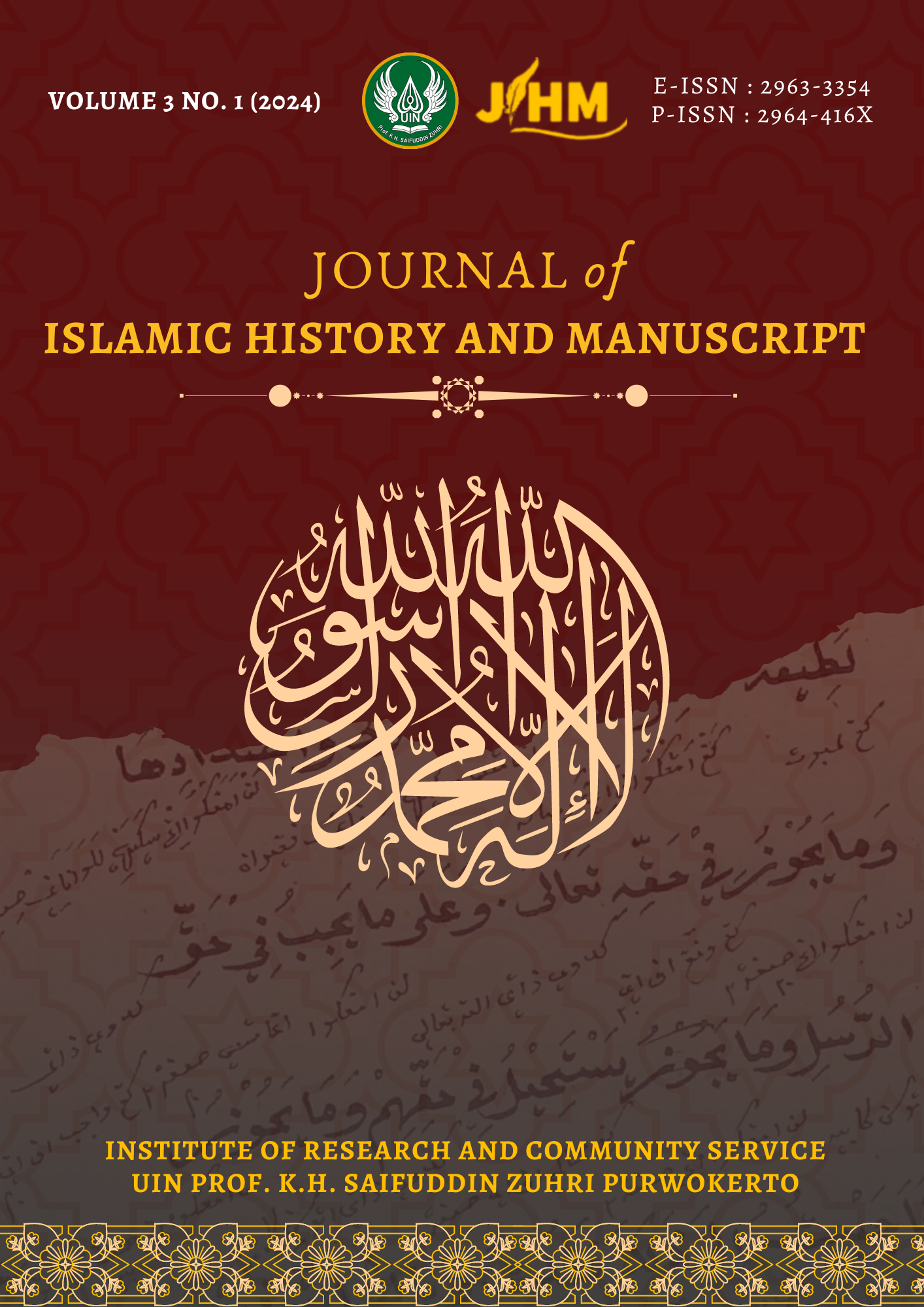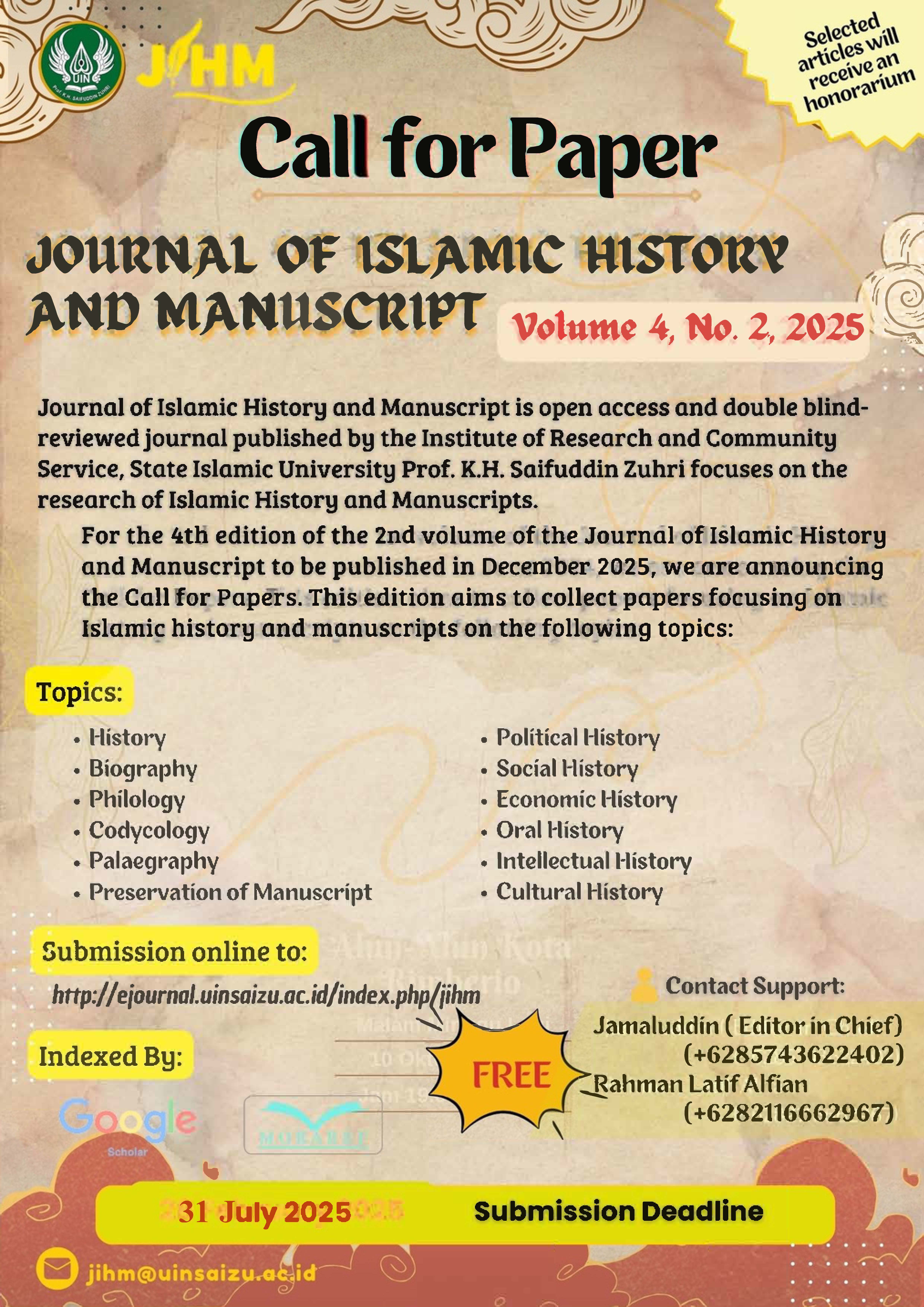Political Biography of Raden Usman Dung: The Dedication of an Ulama in Muara Bungo Tebo, Jambi
DOI:
https://doi.org/10.24090/jihm.v3i1.10457Keywords:
Biography, Family, Politic CareerAbstract
This research aims to find out Usman Dung. Biography of Usman Dung: Family, Career, Religion, Politics. The problem raised in this research is Usman Dung's Biography: Family, Career, Religion, Politics, which includes Usman Dung's family background, Usman Dung's figure, as well as Usman Dung's career in the religious and political fields. The author uses historical methods. In this method there are four stages including heuristics, source criticism, interpretation, and historical writing. To make writing easier, the author uses social role theory and biographical theory. The results of this research are that Usman Dung comes from a family that is able to support him in terms of freedom in continuing his education, he also builds his own family accompanied by a wife who also supports his work by not forgetting to educate his children, in the course of Usman Dung's religious and political career. has gone through many various positions and positions, of course based on the religious knowledge he has, with many career paths starting from being an Educator at a Madrasah then becoming Chairman of the MUI (Indonesian Ulema Council) Bungo - Tebo, and becoming Deputy Chairman of the DPRD-GR (Regional People's Representative Council – Mutual Cooperation) Bungo-Tebo, until he became a Member of the DPRD (Regional People's Representative Council) Bungo Tebo for two terms.References
Akta kelahiran Raden Usman Dung. (2018). Dinas Kependudukan dan Pencatatan Sipil Pemerintah Kabupaten Bungo.
Alfarisi, R. S. (2023, Mei). Wawancara Pribadi di Rimbo Tengah Kota Jambi [Personal communication].
Dung, U. (1983). Catatan Khutbah Sholat Gerhana Matahari.
Dung, U. (2016). Usman Dung’s diary, Jadwal Terapi dan Cara Mengirim Pesan.
Firdaus, M. (1991). Letter from Muhammad Firdaus to Usman Dung.
Kuntowijoyo. (2003). Metodologi Sejarah. Penerbit Tiara Wacana.
Lampiran I Keputusan Gubernur Kepala Daerah Tingkat I Jambi, tanggal 2 Juli 1987 Nomor 271 Tahun 1987. (1987). Anggota Dewan Perwakilan Rakyat Daerah Kabupaten Daerah Tingkat II Bungo Tebo Yang Diresmikan.
Lampiran II Surat Keputusan Gubernur Provinsi Jambi No. 21/VII-13/20-67”. (1967). Gubernur Provinsi Jambi.
Laporan Hasil Kunjungan Kerja Kelompok I DPRD Kab. Dati II Bungo Tebo ke Kecamatan Tebo Ilir, Tebo Tengah, Sumay, 26 Januari 1991. (1991).
Martunis. (2023, Mei). Wawancara Pribadi di Talang Pantai Kec. Bungo Dani Kabupaten Bungo [Personal communication].
Murdy, S. (2023, February 23). Wawancara Pribadi di Telanaipura Kota Jambi [Personal communication].
Nurafrida, Hj. R. (2023, April). Wawancara Pribadi di Telanaipura Kota Jambi [Personal communication].
Rapat Kerja Daerah (RAKERDA). (2008). Kita Berdayakan Qori – Qori’ah Daerah Guna Pengembangan Potensi Sumberdaya Lokal Yang Qur’ant. Lembaga Pengembangan Tilawatil Qur’an (LPTQ) Provinsi Jambi.
Riski, C. (2020). Ulama Datuk Shin Thay Dalam Mensyia’rkan Islam Di Pacinan Seberang Kota Jambi Awal Abad Ke XVIII. Universitas Jambi.
Syam, U., & dkk. (1983). Sejarah Perjuangan Kemerdekaan Republik Indonesia di Daerah Kabupaten Tingkat II Bungo – Tebo (1943 – 1949).
Syarkawi, S. (2009, April 5). Berbuat Tak Kenal Batas Usia (Ketua MUI Kabupaten Bungo K.H. R. Usman Dung). PRO OTONOMI, RADAR BUTE. Rimbo Bujang.
Wahyono, H. D. (2012). Propaganda Orde Baru 1966-1980. Verleden, 1(1), 40–50.
Zuhaida, Hj. R. (2023, Mei). Wawancara Pribadi di Rimbo Tengah Kabupaten Bungo [Personal communication].
Downloads
Published
How to Cite
Issue
Section
License
Copyright (c) 2024 Aura miftah, Siti Syuhada, Zulfa Saumia

This work is licensed under a Creative Commons Attribution 4.0 International License.
Authors who publish in this journal agree to the following terms:
- Authors retain copyright and grant the journal right of first publication with the work simultaneously licensed under a Creative Commons Attribution 4.0 International License. that allows others to share the work with an acknowledgment of the work's authorship and initial publication in this journal.
- Authors can enter into separate, additional contractual arrangements for the non-exclusive distribution of the journal's published version of the work (e.g., post it to an institutional repository or publish it in a book), with an acknowledgment of its initial publication in this journal.
- Authors are permitted and encouraged to post their work online (e.g., in institutional repositories or on their website) before and during the submission process, as it can lead to productive exchanges and earlier and greater citation of published work (See The Effect of Open Access).

















